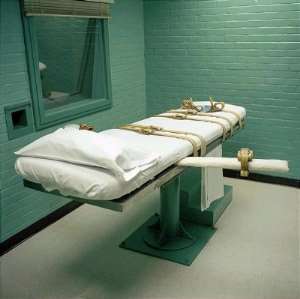
The Attorney-General and Minister of Justice has joined other key players in the administration of the country's justice system in a call for the abolition of the death penalty in the country.
The other institutions, the Commission on Human Rights and Administrative Justice (CHRAJ),the Ghana branch of the Amnesty International and the Ghana Institute of Management and Public Administration (GIMPA) made the call at a public symposium in Accra.
The symposium was organised by the CHRAJ in collaboration with PRAWA Ghana on the topic "Assessing the death penalty in Ghana".
They recommended that in its place should be an alternative such as long sentences without parole. Mr Ayikoi Otto, the Minister of Justice and Attorney General, and Ms Anna Bossman, acting Commissioner of CHRAJ, in speeches read on their behalf described the death penalty as debasing of human dignity and one which had failed to deter crime in the society.
"The death penalty was often promoted as a way to deter violence and make society safer, yet scientific studies have consistently failed to find convincing evidence that executions deter crime more effectively than alternative sentences," they contended.
Mr Otto, in his speech read on his behalf, said the death penalty or sentence of death was the ultimate punishment a person charged with murder or charged with intentionally and unlawfully taking another person's life suffered after being tried and convicted by a court of competent jurisdiction.
He said the death penalty had been in the statute books since the inception of English common law in 1874 in the country, and had consistently been applied by the courts.
Mr Otto said it had been submitted, however, that the system was not "fool-proof", for not all accused convicted of death could be said to have actually taken human life because circumstantial evidence could also lead an innocent man to the gallows.
He said it was submitted that because of the seriousness of the offence of murder and the emotional turmoil it caused the family of the victims, a long term of imprisonment without parole could be a good substitute.
He said contrary to the opinion held some years back that the death penalty would be a deterrent to the offence of murder, research in recent times had shown that more people were beginning to call for its abolition for it to be substituted with alternative kinds of punishment.
A speech read on behalf of the acting Commissioner of CHRAJ, Ms Anna Bossman, said death penalty no longer had a place in humanity.
She said it took away the fundamental human rights and demeaned human dignity. She said records at the country's prisons indicated that 148 inmates were on death role even though since 1993 there had not been any death penalty carried out.
She said in view of this, it would be proper to abolish it completely from the statute books. On his part, Prof. Ken Attafuah of GIMPA said death penalty defied human rights standards and that any law that clashed with human right law must fall.
He observed that death penalty had not succeeded in deterring others from committing murder and so had been abolished in more than half of the countries in the world, both in practice and law.
Prof Attafuah cited executions during the days of the Armed Forces Revolutionary Council (AFRC) and the Provisional National Defence Council (PNDC) and said it never deterred people but rather violent crime increased.
He said since then nothing had changed on the crime scene and the people of Ghana were still those that they were.
He, therefore, suggested that governments must practice the tenets of good governance and improve the economy for the people to live a decent life.
The Executive Director of the Prisons Ministry, Rev. Dr Chris Hesse, speaking on the topic "assessment of prison conditions in Ghana," called for improved conditions at the country's prisons.
He said the prisons must be decent for keeping humans to enable its objective of reformation and rehabilitation to be achieved.




 Ghana will make maiden voyage into space should Bawumia become President — Chair...
Ghana will make maiden voyage into space should Bawumia become President — Chair...
 Train crash: Despite the sabotage, we shall not be deterred and will persevere —...
Train crash: Despite the sabotage, we shall not be deterred and will persevere —...
 Tema-Mpakadan railway project a perversion of the original viable concept design...
Tema-Mpakadan railway project a perversion of the original viable concept design...
 Train crash: Elsewhere, everyone involved in the test will either be fired or re...
Train crash: Elsewhere, everyone involved in the test will either be fired or re...
 Ghana, other election bound-countries must build fiscal buffers – IMF admonishes
Ghana, other election bound-countries must build fiscal buffers – IMF admonishes
 Parliament reconvenes late May, denies Speaker Bagbin delaying recall over NDC t...
Parliament reconvenes late May, denies Speaker Bagbin delaying recall over NDC t...
 $100m needed to revitalise Ghana's poultry sector — GNAPF
$100m needed to revitalise Ghana's poultry sector — GNAPF
 Driver arrested for causing train collision on Tema-Mpakadan Railway Line
Driver arrested for causing train collision on Tema-Mpakadan Railway Line
 Police grab trucker for Tema-Mpakadan rail accident
Police grab trucker for Tema-Mpakadan rail accident
 Gov't plans to revise traditional customs following Gborbu child marriage
Gov't plans to revise traditional customs following Gborbu child marriage
